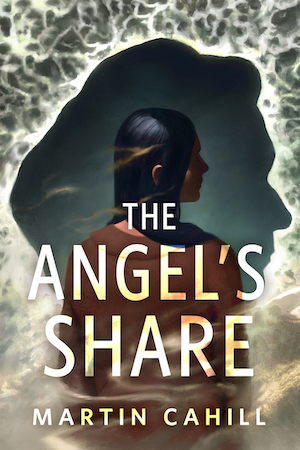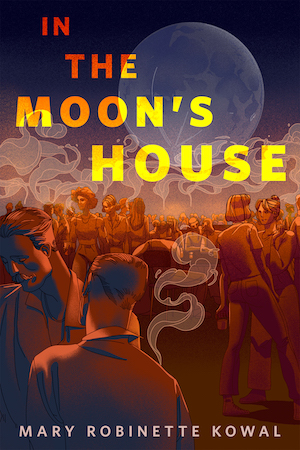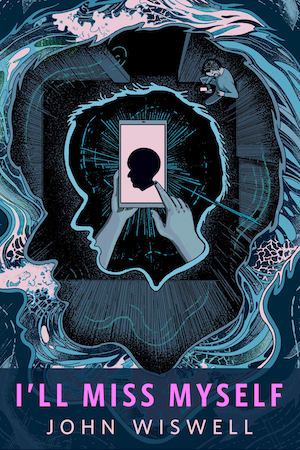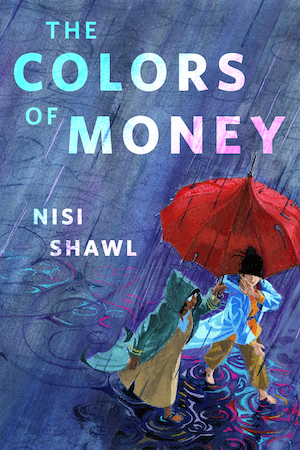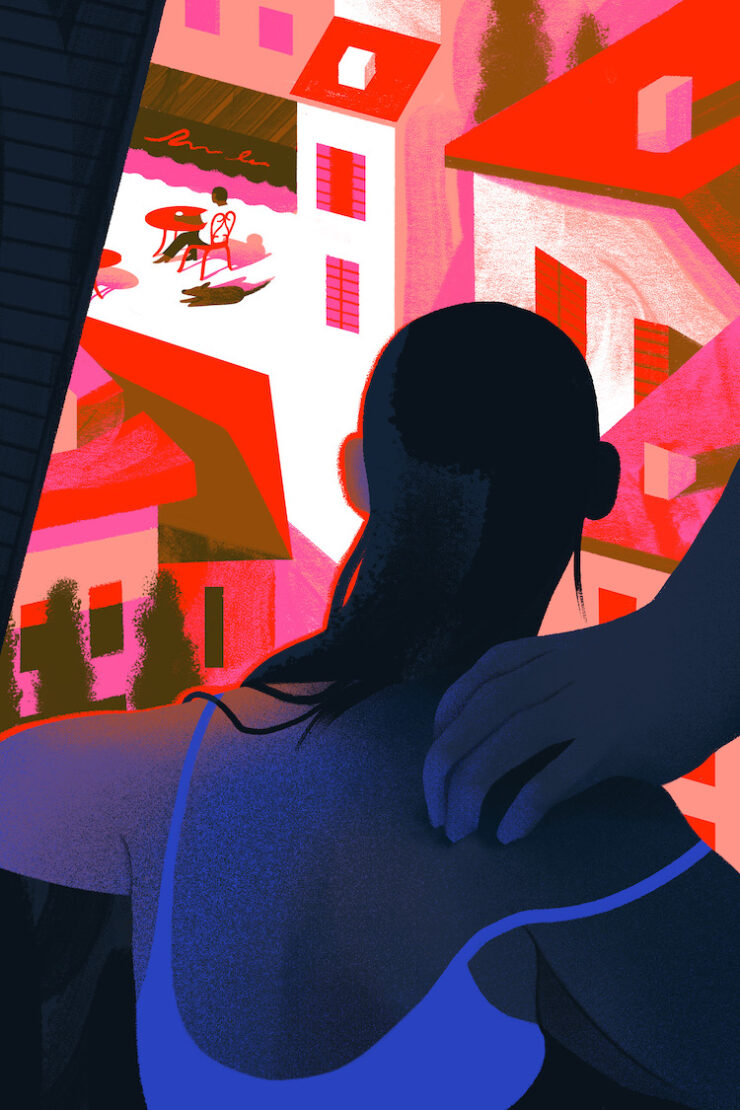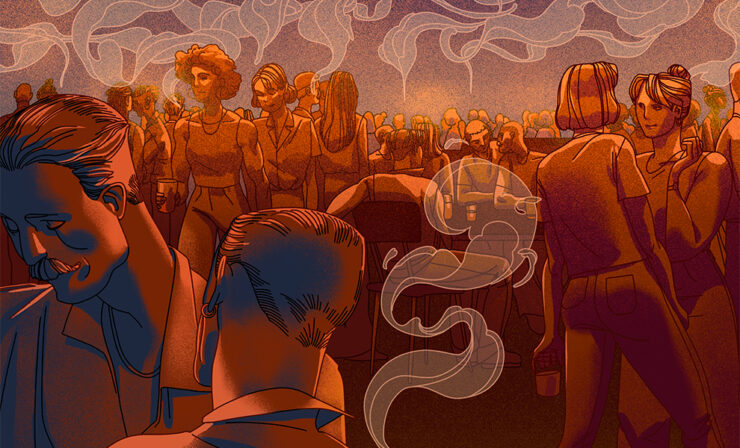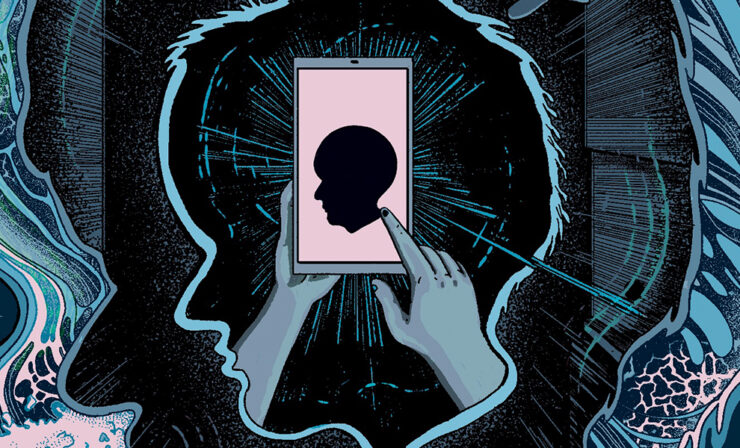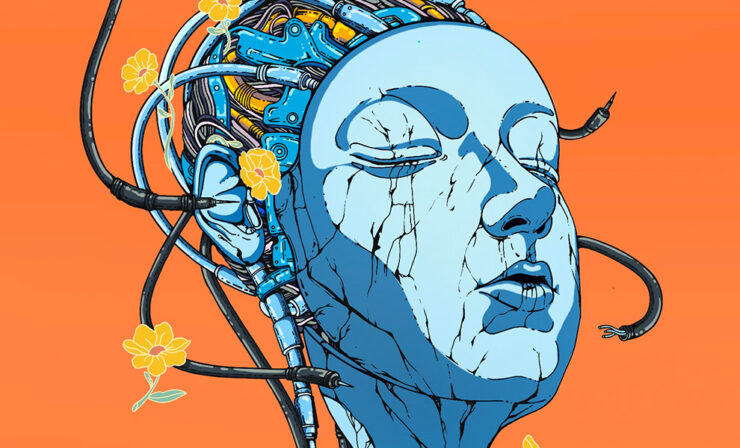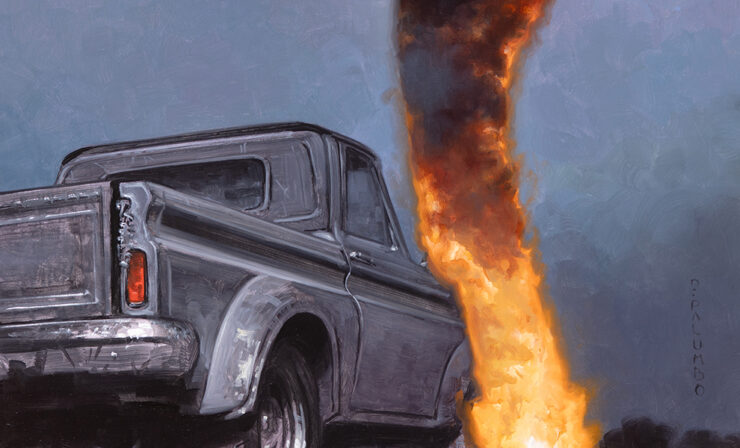On a trip to Italy, a woman stuck in a crumbling relationship discovers the city she loves holds a secret that could change her life…
“Beneath my sorrows, I hold a city.”
Nizar Qabbani
She quickly realized they should never have come back. Because she was in a town she loved with a man she no longer loved and was beginning to hate. This time everything about the place was only loud plaintive ghosts of what might have been and now-stained lovely memories of their last visits here. All kinds of sadness and regret in stark bitter contrast to the ancient city’s heartbreaking beauty.
“Where do you want to eat tonight?”
She was standing in front of a mirror fixing her hair when he spoke from the other side of the room. Seeing him reflected in the mirror she looked away, not wanting to make eye contact. Her hands stopped moving at the thought of spending another hour at a table with him, studying the menu for too long to avoid conversation. Smoothing out the napkin in her lap again and again while sneaking glances to see where he was looking, checking the expression on his face. Usually if there was talk now between them it was almost always stilted, loaded with silences which led to sentences or sometimes even single words that could and frequently did explode into accusations, denials, blatant lies, and hurtful exaggerations . . . Too many battles had been fought over white tablecloths, empty wineglasses, and delicious half-eaten desserts ruined by words that should never have been said but now were, with increasing frequency.
Sometimes she felt she was suffocating inside her own life; as if it were one of those plastic bags dry cleaners put over clothes. When she breathed, she inhaled herself and her failure. There was no more air.
Buy the Book
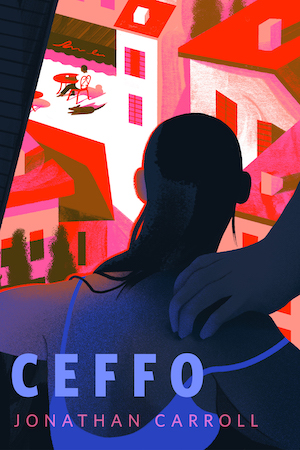

Ceffo
The trip had been his idea. At first she thought it would be good to get away from home, where there was so much silence, tension, and gloom. He was very adept at using silence, had honed it to a killing edge and used it expertly on her for hours and even days, sometimes from morning till night. She realized how effective it was the day she was suddenly aware she’d been unconsciously mumbling to herself under her breath, something she’d never done before in her life. Was she going mad or only desperately hungry for the sound of a human voice, even her own?
Her sister came to visit and was appalled at the way he behaved. “You have to get out of here. You can’t let him go on treating you this way!”
“It’s complicated.”
“What’s complicated about it? He treats you like shit. I’ve never seen anything like it.”
She knew it was true but hearing it from her sister only made it worse. Hearing the grim truth from someone else’s mouth, especially someone who you know loves you in all the right ways, is brutal.
“I have no money, no job. I have nowhere to go. I’m completely dependent on him.”
“Then go home. Stay with Mom and Dad till you figure things out and come up with a plan. They’ll love having you there.”
“They’re both old and sick. I wouldn’t want to burden them. You know how they’d worry. Dad might even do something crazy like get on the phone and call him an asshole.”
“Which he is! So instead you’re going to stay here and let the man slowly eat you alive?”
The two sisters stared at each other with a swirling mixture of anger, love, pity, and shame.
“Has he— Has he ever hit you?”
“No, but sometimes when things get really heated between us I wouldn’t put it past him.”
The restaurant was a ten-minute walk from the hotel. Part of the way there was along the harbor and both of them loved the familiar scenery. One of the yellowing city walls was madly festooned with graffiti and tagging.
He stopped to look at it and shook his head. “I hate fucking graffiti, tagging especially. It’s not like they even try to do it well—always just childish scribbles. They make no sense to anyone but the person who did it.”
What he said didn’t interest her, nor did the frantic jumble and splash of words, pictures, letters, and numbers covering the wall—today’s hieroglyphics. But she looked at it anyway because he was watching to see what her reaction would be to his comment. She wanted to have a nice dinner with no drama. She knew it was best to just pretend to agree with him now and hopefully move on. Then she saw the word on the wall and smiled.
She said it out loud. “Ceffo.”
“What?”
She pointed to a word scrawled large in black, high on the wall. “Ceffo. I know what it means. A bad guy or a creep.” She smiled even more and said the word again quietly, as if to herself.
“What, suddenly you speak Italian?” His voice was all sneer.
It wasn’t so much what he said as how he said it—his tone of voice and the snide, condescending inflection. His “question” very clearly came across as: You of all people speak Italian? No way.
Why did he have to be like this? Why had things between them ended up in this black hole dead end poisonous swamp of two people drowning each other when not so very long ago both of them truly believed they had found the one?
Now she only wanted to lash out at him but knew it would just lead to further unpleasantness. Lips pressed tightly together, she shook her head, gave him a furious look, and walked away. He called out to her. She ignored him. Even with her back turned, from past experience she was certain she knew what the expression on his face would look like now: smug, self-congratulatory, sure that what he’d just said had struck somewhere close to her heart. Increasingly these days he seemed to actually enjoy making her feel stupid, inept, useless, or hysterical even when she knew she was right about something.
She kept walking without looking back at him. Then she heard another man’s voice behind her. “Hey motherfucker! Yeah you, Mr. Englishman.”
She heard the voice say in heavily accented English, “You Englishman, hey? I heard you talk to her. She don’t like what you say. I saw her.”
“Go away.”
She turned and saw two young men facing him a few feet away. One was short and thick but obviously muscular beneath a tight-fitting blue, gold, and white T-shirt with S. S. Lazio emblazoned on the front. The most striking thing was how unattractive he was. Even at a distance she could see his head was much too small in proportion to his body. It looked like a coconut on top of a tree trunk. Very short crew cut hair, a large nose below beady reptilian eyes.
“What do you want?” her man demanded. A demand, not a question.
Alarmed, she sucked in her breath. As soon as he spoke to them she knew it was wrong. Wrong words, wrong tone of voice, wrong stance to take with these tough guys obviously looking for trouble.
He always had to be macho, even in a menacing situation like this. Always. Always had to be the dominant force, the big man in charge of things. When they were first going out she’d found the trait attractive. At the time it had made her feel safe when they were together. Not anymore.
Her sister detested this “macho man” pose and made fun of it to his face, more than once calling him “Weekend Rambo.” He didn’t like it. Didn’t like it when anyone clapped back at him or his view on things. One time when her sister was visiting, she even told him to fuck off after they got into a heated argument about politics and he spoke down to her like she was a dumb child.
Right now this alpha dog part of him had stupidly snarled at these two creeps who were goading him.
Lazio said, “What do I want? I want your wife, man! I want your car. I want your house. I want your money.” He laughed and looked over a shoulder at his grinning friend who was enjoying the show, thickly tattooed arms crossed over his chest.
“Just go away, huh? You and your buddy. No more. Go away.”
Without warning, Lazio punched him hard in the stomach.
Bent over from the blow, her man staggered backward, tripped, and fell.
“Stay down. Don’t get up. I don’t like your fucking face, Mr. English.” Lazio turned to her and smiled. She couldn’t help noticing his teeth were beautifully white and perfect. A mouth that could have been in a toothpaste ad.
Raising his right arm, he patted his chest over his heart while looking straight at her and continuing to smile. He said something but she didn’t understand. She shook her head, shrugged her shoulders. He nodded and said it again, loud: “I’m Ceffo.”
Despite having been punched and humiliated, her man insisted they still go to dinner. She said if he wanted to go back to the room to rest it was fine—they’d get something to eat later. He flashed her an angry glance, as if she was somehow guilty for what had just happened. But she knew him well enough that she was sure the hostile look came from the fact that she’d witnessed the confrontation and the fact that her “Weekend Rambo” had done nothing after being hit—just stayed on the ground watching Ceffo and his friend walk away.
“No. Come on—let’s just go.”
The last time they were in the town they’d discovered a great little trattoria, totally unassuming yet still atmospheric; they served the most wonderful food there. Right before arriving now, they passed a closed shop also splattered with graffiti. In the middle of the chaotic word and picture spew was the word diarrea. Frowning then smiling at the oddness, she assumed the word meant the same thing in Italian as it did in English. What on earth would compel someone to spray-paint that word on the front of a lingerie store?
At another time she might have brought it to his attention as an interesting observation, but she knew he was in no mood for chit chat at the moment. By insisting they go to dinner after the assault, she knew he was trying to pretend it had been no big deal—a blip in their plans, a few jarring minutes that deserved only an indifferent shrug.
She assumed this was why, when they sat at the restaurant table looking over the menus, he was chatty and actually quite charming. She hadn’t seen that side of him in ages when they were alone together. In public or with friends it was a role he played. Generally speaking, the world loved the guy. But she hadn’t seen him like this just for her in months. These days he often blamed her for his bad moods and overall unhappiness. She wasn’t having it. From the beginning she had tried so hard to be a positive, supportive partner. But on a day-to-day basis he turned out to be one of those people never satisfied with their lot, their share, their partner, their life in general.
“I’m going to have the spaghetti with clams,” he said.
She wanted the vongole too, but knew he didn’t like it when they ordered the same thing. He liked to sample whatever she ordered. Quietly sighing, she said she’d have the risotto with mushrooms.
While taking their orders the waitress, who was the wife of the owner, noticed the sadness in the woman’s eyes. She remembered this good-looking couple from the last time they were in town and how much they had enjoyed her restaurant. Plus they were big tippers.
So why did the woman now look like her cat had just died? Was her handsome man to blame? He did have an air about him the waitress didn’t like. The way he tried to sound cool while mispronouncing most of the Italian words when he gave his order. The self-important expression on his face when he sampled the cheap house wine. The two-second fake smile he gave her. Yes, he was definitely cretino material.
When their food came, before she could move, he reached a fork across the table and scooped up some of her risotto without asking or making eye contact. With heavy irony, she asked him, how it was?
“Good, but tonight it’s clams for me.”
During the meal she was curious to see if he would bring up what had just happened with the two men. He didn’t, which she took as a hopefully good sign he was just going to ignore the scary confrontation and not let it ruin the evening or the rest of their stay in this wonderful town.
Two hours later, back at the hotel, he was locked in the bathroom groaning and shitting his brains out.
“Fucking clams! Fucking clams! Why did I eat those fucking clams?”
She sat on the large bed, hands unmoving in her lap, thinking about the two words she’d seen written on the city walls earlier that had forecast the exact scenario of the evening’s events. How could it be? It could not possibly have been just some weird coincidence. How many men are named Ceffo? Why would anyone want to paint diarrea in big fat letters on a storefront? Why had she seen those two words just before they happened?
The only thing tying the words together was that both “happened” to her fiancé, not her: Ceffo’s punch and now this diarrhea. Even what they ate for dinner—originally she had been planning to order the clams but had deferred to him.
“Are you still out there?”
“Yes, of course.” She shook her head at the silliness of his question. Where else was she supposed to be?
“Go down to the desk and ask if there’s an all-night pharmacy around here. I really need some Imodium. If so, please go get me some. This is killing me. I keep thinking I’m done and there’s nothing left inside. But then I get hit by another wave . . .”
Too much information. She stopped listening, stood up, and went for her coat. “You’ll be all right alone here?”
“Are you trying to be funny? Just go down and ask,” he ordered nastily.
She made an unhappy face at the bathroom, at him in there, and walked out, closing the door to the room a little too loudly.
A nice young man at the reception desk directed her to a twenty-four-hour farmacia several blocks away. The receptionist watched as the statuesque woman in a long whiskey-colored coat—she looked like a 1940s movie actress—walked out of the hotel. What could she want at a farmacia at this late hour?
“You are English?” The night pharmacist was delighted to have a chic customer and was embarrassed for her when she asked for Imodium. He could not imagine her sitting suffering on a toilet seat.
“South African.”
“South Africa! You come from so far. Is this your first time here?”
“No, I’ve—we’ve—been here several times before.”
“You and your husband?”
She started to say fiancé but boyfriend came out instead. It was not the first time she’d referred to him that way. The thought of actually marrying the man had become more and more remote recently. Spend the rest of her life being demeaned and belittled, nitpicked for every little mistake he believed she made? No. But she needed to gather strength and courage to walk away. Living with him had bled her of both.
“May I suggest you something?” He handed over the medicine and smiled crookedly, as if he might have been too bold in asking her the question.
“Of course. Please do.”
“Have you been to Café Fellini yet?”
She shook her head.
“It is just down the street from here.” He gestured off to the right. “The oldest café in the city. It used to be called Café Monopoli, but the famous film director Federico Fellini once went there years ago and they changed the name to honor him. It is very atmospheric. Very romantic. You and your boyfriend will enjoy it for sure. They stay open very late at night too. It is open now.”
“Sounds wonderful! Thank you. We’ll be sure to go there.” She paid for the medicine and, hesitating a moment, stuck out her hand to the man to shake as a sign of gratitude for his recommendation. Pleased, he took her hand and bowed his head a moment in deference. She thought the gesture charmingly old-fashioned.
Out on the sidewalk again, she should have turned left to return to the hotel. But she thought, I don’t want to go back there yet. He doesn’t know how long it took me to find an all-night pharmacy, go there, get this stuff, and return. What am I going to do back in our room, sit on the bed listening to him groan and flush?
No, she needed down time from him. She turned right instead of left and set off in search of Café Fellini. Take a quick look at the place. If it was as great as the pharmacist said, maybe have a quick nightcap alone. Blissfully alone, without having to be on the kind of constant psychic edge she almost always was whenever they were together these days.
In the past when they were in the town, the couple spent a lot of time at a small wine bar enoteca named Da Bel Cane (Beautiful Dog). The owner of the place was an intriguing man named Mauro. In his early 50s, he had once been an award-winning sommelier at a leading restaurant in Bologna. But eventually he gave up the prestigious job to pursue his great love, mountain climbing. After intense training he became a certified mountain guide in the Dolomites. The job lasted a few good years until he fell a great distance and permanently damaged his back. Doctors forbade him to ever climb again. At the time he was married to a fabulous cook. While he recuperated, she taught him how to make a small number of delicious dishes perfectly, which he later served at his enoteca. His wife died of covid when it scythed its deadly path through Bergamo, where they were living at the time.
One afternoon when the three of them were alone in his bar, Mauro and the couple talked about his dead wife. He said, “To be God honest, I miss her more now than I think I ever loved her. Is it such a bad thing to say or to feel? Because it is my truth.”
The beautiful dog part of the bar was an enormous Great Pyrenees dog named Rosa who loved and slobbered over everyone who came into the place. Mauro called her his second wife.
The more times the couple visited the city, the more the woman liked talking to Mauro. One of the few things she had looked forward to on this trip was hopefully seeing him again. He was warm, funny, very bright, and had led a fascinating life: climbing mountains all over the world, knowing famous people through his work as a celebrated sommelier, describing in brutal but fascinating detail what it had been like to live in the eye of the covid storm in Bergamo. What she particularly liked about the man was he always seemed eager to chat about anything interesting, no matter the subject. It was something she had always loved to do. On the other hand, her fiancé often said she talked too much. But it was “okay” with him because he thought it was one of her “adorable” qualities.
Several times when her man was taking his daily afternoon nap, she would go to the bar for coffee or a glass of Nero di Troia wine while secretly hoping the place would be empty then so she could talk to Mauro.
Naturally, sometimes she daydreamed, especially when sad or distraught by her home situation, about what it would be like in another life to live with a man like Mauro. To run the bar with him, wait on customers, cook together, and walk the sweet giant dog with him through the winding streets of the beautiful crumbling old town. She felt this was a man she could grow old with and be content.
“Annette! Hello!”
And then to her great delight there he suddenly was, sitting alone at one of the tables outside Café Fellini on this cool fall night. He had grown a beard that was mostly white since the last time she saw him. His hair was longer too. It looked like he had lost weight. Except for the beard, the changes suited him.
She was thrilled. “Mauro! What are you doing here? Why aren’t you at the bar?”
They half-embraced and kissed each other on both cheeks. He smelled of a sexy spicy cologne and cigarettes.
“Business has been very good this year, so I hired my brother-in-law to work there part-time. Where is Julian?”
“Back at the hotel. He’s not feeling well so I had to go get him some medicine.”
A waitress came out of the café and asked if Annette wanted to order anything. She asked for a limoncello. The woman nodded, pointed at her, looked at Mauro, stuck out her lower lip, and gave him a thumbs-up. He smiled and waited until she left before saying, “I’m sure you will be happy to know Daniela approves of you. I won’t disappoint and tell her you’re not my date. Anyway, I like her illusion.” He raised his wineglass in a little toast to his imaginary date.
Without thinking, Annette fired right back at him, “Well, for the time we’re here talking now, I am your date.” It came out spontaneously and she almost giggled at how provocative it sounded. When was the last time she had openly flirted with a man? Where was that part of her these days? Did it still even exist?
A memory blinked on in her head. When she was first dating Julian and crazy for everything about him, they had dinner one night at his apartment with his best friend and the best friend’s wife. After dinner Annette was in the kitchen at the stove making coffee. The friend walked into the room and up very close behind her. In a low, urgent voice he said, “I don’t know how else to say this, but I would give anything to spend a night with you.”
She was not shocked or flattered by what he said. Because she knew who she was in those days, what she wanted, and what she offered to the world. Without even turning around to face this man she said in a calm voice, “No, you’re not him.”
Her back still turned, she continued making coffee. Where was the strong, cool, self-assured woman who indifferently brushed aside things like this as if they were a fly on her hand?
Where was the woman who, before they had ever even kissed, was walking with Julian past a hotel when she tipped her head toward the door and casually said, “When are you going to take me there?” Ten minutes later they were pulling off their clothes in a room he’d hastily rented.
Where was that woman now?
“Annette?”
She snapped out of her sad reverie and looked at Mauro. “I’m sorry. Did you say something?”
“Never mind. What were you thinking just now? You looked happy.”
Tears came to her eyes. She quickly looked down so he wouldn’t see them. But he did.
“Annette! I’m sorry. Did I say something bad? I’m sorry.”
She shook her head and forced a smile. “It’s nothing. A sad memory flew into my head from somewhere. Don’t worry about it, Mauro. Tell me about your life. Mine is very boring.”
His face grew solemn. “Boring you’re not, Annette. You maybe are other dark and horrible things, but so are we all. You have never been boring to me. Never!
“Ah, look who is here—your old friend.” His huge white dog padded slowly out of the café and over to their table. “Rosa loves coming here with me because they feed her like a queen. When I protest, they tell me to shut up.”
They spoke for almost two hours. Sometimes she looked at the bag containing the Imodium, then looked away and forgot about it. She had another limoncello. Mauro made her laugh again. It felt so good. Rosa sat next to her and for a lovely while, the dog rested its heavy head across Annette’s lap. Once in the middle of their rich rambling conversation, she couldn’t resist reaching across the table and squeezing his hand. “I’m so glad to see you again. So glad, really.”
She shook her head, not understanding what he said.
“I feel the same way.”
Her world began to really tilt as soon as she got back to the hotel room. All the way there she tried to compose a convincing lie to tell Julian about why it took so long to get his medicine. She certainly wasn’t going to tell the truth, although she knew he liked Mauro very much, saw him as a friend and no kind of threat or competition.
Buy the Book


Ceffo
But it turned out there was no need to lie. When she opened the door to the room and called out that she was back, he said from inside the bathroom, “You were gone, like, ten minutes! Did you actually get it?”
“Yes, of course.” Taken aback by what he’d said, she glanced at her wristwatch. Instead of indicating just past eleven, the dial now read 8:37. It was not possible. As she was leaving the café she had checked the time and saw more than two hours had passed since she left the hotel in search of a pharmacy. Her watch now said she had been gone only twenty minutes. Alarmed, she looked at the bag in her other hand containing the Imodium, as if to physically verify she had run the errand before going to Café Fellini and meeting Mauro there.
The bathroom door opened and Julian came out, adjusting his belt. “Could I have it?”
She handed him the bag. He looked at it, then at her. “What’s the matter?”
“What do you mean?”
He pointed to her face. “You look upset. Did something happen out there?” He was instantly on alert, clearly remembering what had happened with Ceffo earlier that evening.
“No, nothing. I just got your stuff and came back here.” She looked at her watch again to make sure of the time. It said she’d only been gone twenty minutes, not two hours. How could it be possible?
The next morning Julian felt better. He suggested after breakfast they walk around town visiting their favorite places, have lunch somewhere, and then go to The Beautiful Dog for an afternoon drink to see Mauro and catch up. He always had one or two great stories about his customers or what had been going on in the town since they were last here. Annette agreed but tensed, worried that when they saw Mauro he would mention meeting her the night before. Julian wouldn’t like hearing that. He didn’t like it when she kept secrets from him, even little ones.
This particular door didn’t swing both ways. She was certain her fiancé had some juicy secrets he kept from her. Julian was very comfortable in his hypocrisies. If she ever brought one of them up, had him dead to rights for some crap he said or did, he dismissed her protest with a smirk or, his favorite, a head shake and melodramatic deep sigh. As if she was too hysterical or shortsighted to understand his position, which of course was the correct one. “Hysterical” was his favorite word to use when they argued. “If you weren’t so hysterical, Annette,” or “I can’t talk to you when you get hysterical like this . . .”
In their last fight a few days earlier, he’d tried to slip it in on her yet again. But she wasn’t having it. Fed up, she stabbed an angry finger at him and barked out, “Bullshit! I am not hysterical now—I just happen to be right but you won’t admit it, as usual.
“You throw the word at me all the time like a poison spear whenever your arguments suck and you know it. It’s either a spear or a crutch word to lean on whenever you know you’re full of shit but can never admit it. You always have to be right, don’t you Julian? It’s an obsession with you. Such a fragile ego. I’m not hysterical. But you, you are a coward.”
Too often Annette had failed in the past to say such things to this man. But recently it had reached a breaking point between them where either out of desperation or newborn strength she was ready to get in the ring with him and punch back.
On someone’s Facebook page she had read and then written down in her Bullet Journal a quote supposedly from the actress Bette Davis: “It’s better to be hated for who you are, than to be loved for someone you’re not. It’s a sign of your worth sometimes, if you’re hated by the right people.”
They passed a nice morning wandering around the town, window-shopping, photographing fishing boats going in and out of the harbor, stopping twice for cappuccino and spremuta d’arancia.
Both of them loved to people watch. There was no better place to do it than at an outdoor Italian café in early fall. Passersby are still on summer parade, doing their daily passeggiata in centro; the sun is gorgeous, morning glare bright and just warm enough for one to be comfortable in shirtsleeves or a summer dress and of course sunglasses. Knowing the weather will grow a cold edge soon and drive you inside to sweaters, hot soup, and looking at the world through window glass for the next several months makes these last stolen days of summer a small yearly treasure.
They arrived at The Beautiful Dog in the middle of the afternoon, around the time the town grew quiet and full of growing long shadows. Stores were mostly empty while waiters stood around, impatient for the last diners to finish their coffee and leave so they could clear the tables and start to set up for the evening service.
When they walked past Café Fellini, Annette smiled, remembering her meeting the night before. She thought about the change in Mauro’s physical appearance—the beard and longer hair. She didn’t know if she liked this new beard on him. Not that it mattered. She would never have the nerve to tell him, “I don’t think a beard suits you.” He wasn’t a handsome man like Julian. But she had had her fill of handsome men. Their physical charisma had much less effect on her now in middle age than it had when she was younger.
Mauro’s secret weapon was not his physical appearance but something much more powerful and seductive: He listened and remembered. Whenever they spoke, Annette felt certain she had his full attention. He was completely there and eager to hear whatever it was she had to say. So very flattering. Too much of the time with Julian it was clear his mind was somewhere else when he was supposed to be listening to her.
Last night she had shyly admitted for the first time to anyone, “Julian says I talk too much.”
Hearing this, Mauro’s eyes narrowed and he broke eye contact with her for the first time all conversation. Rosa was at his side. He stroked the dog’s head several times before he spoke. “I’m sorry, but this makes me not like your guy so much.”
Spontaneously she blurted out, “He’s said it more than once. Whenever he does, it always hurts.” It felt great to finally tell someone. Like she’d opened a window in her heart to let a blast of fresh air come in and clear out the stale.
Hearing her, Mauro’s hand stopped stroking the dog. “Asshole.”
He said it so forcefully but with such a heavy accent that she had to fight back a grin. Looking at her, he grasped this and seemed to know exactly why she was smiling. “It sounds much better in Italian. Harder: Stronzo!”
“Stronzo?” Her smile grew.
“Yes. That’s your Italian lesson for the night. One day I will teach you more filthy words.”
Mauro was not at his bar when they got there in the late afternoon. The couple sat down at an outside table. All the other tables around them were empty. A man who looked to be in his thirties came out of the bar and took their order. Julian asked if he spoke English. The other nodded. Julian asked if Mauro was around. “We’re old friends, in town for a few days and would love to see him. Also, where’s Rosa? She’s always here.”
“They are dead.”
Both Annette and Julian froze. “What?”
“They are dead. Five months. There was an auto crash. The dog was with him in the car.”
Stunned, horrified, and confused, oddly the first image that came to her after hearing this news was an image of Mauro’s zippy red Fiat Abarth Cinquecento car, which he was so proud of. They had ridden with him on several occasions in the past. He was a fast, skilled driver, having raced go-karts competitively for several years as a young man.
“How did it happen?”
The waiter shrugged and brought a hand to his mouth as if taking a drink. “A drunk driver. A big fire.” He turned and went back to the bar.
Julian looked at Annette. “I can’t believe it.”
His normally chatty fiancée said nothing. The expression on her face said nothing.
“Are you all right?”
Instead of answering, she looked blankly at him, stood up, and just walked away.
“Annette!”
She kept moving.
“Where are you going?” He started to stand but stopped and slowly let himself back down again onto the seat. “Let her go,” he said out loud to himself. “Let her work it out. She’ll be back.” He nodded. It was the best way. Let her work through her shock and grief, then return. In happier times, she’d once said while they hugged, “You’re my fireplace.” He had been touched by the funnily affectionate metaphor.
Taking a sip of his drink, he said out loud, “I’m her fireplace. She’ll be back when she’s ready.”
Annette walked until she came to the harbor and sat down on a green bench facing the water. She was calm. Mauro had been dead for months but she’d talked with him last night for two hours. Yet she was calm now about it. She’d petted Rosa while they spoke and felt the heavy weight of the dog’s big white head on her lap. Yet she felt calm. Why wasn’t she freaking out?
“Do you mind if I sit here?”
Caught up in her mind-chaos of Mauro’s death and their impossible conversation last night, she didn’t register the nearby voice for a few seconds. When she glanced to the right, Humphrey Bogart was standing at the other end of the bench looking at her.
Last night talking to Mauro about their favorite films, she’d gone on and on about what a huge fan she was of Bogart. Now here he was standing three meters away from her, very much alive although he’d been dead for more than half a century. He had on the iconic white tuxedo jacket and black bow tie he’d worn in the film Casablanca. Holding a lit cigarette in his hand, he tapped off the ash and sat down.
When he spoke his famous voice was honey over gravel. “It’s been a hell of an afternoon for you, eh?”
“Is it really you?”
Bogart nodded and dragged on the cigarette.
“Was it really Mauro?”
Bogart nodded again. “We thought seeing the two of us was the best way to convince you.”
Annette shook her head, not understanding. “Convince me of what?”
“To stay here. The town wants you to stay.”
“The town wants me to stay?”
“Yes.”
“And you’re here to tell me this?”
“Yes. We know you’ve been very unhappy lately so we’re asking you to stay here. It’s your safe haven. If you stay, you’ll be all right. If you go back to your old life, things will not end well. But I think you know that already.
“We can even help convince Julian to leave without you. You met Ceffo last night. Then afterward the result of what the restaurant served your fella for dinner? It was all planned.” Bogie smiled and flicked the last of his cigarette perfectly into the water. “It’s nice in this town. I wish I’d known about it when I was alive. Betty would have loved it here.”
Despite all the craziness swirling around her at the moment, she thrilled to hear Humphrey Bogart say the name. Annette knew it was the name he called his wife, Lauren Bacall.
She looked down and saw he was wearing a pair of beautiful whiskey-colored leather sneakers. Earlier when she was window-shopping with Julian, she’d stopped them in front of a shoe store and pointed to an identical pair in the window. She urged him to go in and try them on because she was sure he would look good in them. Julian wasn’t interested. The only thing he said about them was that the sneakers were the color as her coat.
She was sure the ones Bogart wore now were the same. “What would I do if I stayed here?” She didn’t even know why she asked the question because the thought of doing it was preposterous. Stay? Just like that? What about Julian? She didn’t speak Italian. How could a town actually like someone and want them to stay?
“You could work with Mauro in his bar.”
She hated saying it but had to. “Mauro’s dead.”
“Not in the moment of the town’s history where you would live.”
Confused, she shook her head. “I don’t understand.”
“You’ve been to New York. You told Mauro about your trip the last time you were here.”
“Yes, I remember.” She frowned. Their infamous New York trip. It had started out so well but soured three days in. Julian’s big business deal there fell through and he turned his bitter disappointment into rancor toward her.
Bogart took a red-and-white pack of Pall Mall cigarettes from his pocket, shook one out, and lit it with an elegant gold lighter. “The New York you visited back then is no longer the city it is now, of course. Time’s passed—things have changed. Buildings go up, businesses fail, babies are born . . . Everything changes; we all know this and live with it. The New York you experienced was not even the same city other people who were there at the same time experienced. We’re all different, so everyone’s perception of things is different.
“If you choose to stay here, you will go back and live in a certain time of the city’s recent past. All cities keep their pasts perfectly preserved and intact. If one of them likes you and wants you to stay, they make room for you in their history. You would live here in the time when Mauro was alive. If you do, you’ll probably stop him from dying.”
“Why me? What have I done to deserve this?”
“The city likes you, but it loves Mauro. It doesn’t want him to die. It remembered how well you two got along in the past. So it believes you can prevent his accident from happening if you’re placed back in time together. It knows he really likes you.”
She was overwhelmed with questions but also a small bright vision of a new possible life so much better than the one she was trapped in now. “There really are different versions of this city?”
Bogart squinted when smoke blew into his eye. “Sure. Versions. Epochs. Chapters. Call them what you will. This city has been around two thousand years. That’s a lot of preserved history. There are different versions of everything, Annette.” He smiled. “The woman with Julian last night at dinner was very different from the one a few hours later at the café talking and laughing with Mauro, right?
“But the Mauro you spoke to last night was the one who would die in a car crash two weeks later. As soon as you walked out of the hotel last night you entered the city as it was six months ago. Mauro obviously had no idea he was doomed. Cities have the power to change things like time and circumstances that happen within their city limits. They can move people and things around in time just a little if they believe it’s necessary or beneficial. Not too much. Nothing drastic, just some heres and theres.”
She stuck out her chin at him. “Like bringing back movie stars from the dead for dramatic effect?”
Bogart smirked and pointed at her. “Yeah.”
She put both hands on top of her head. “If I were to stay, I would go back to that night—what, six months ago?”
Bogart tilted his head to the side and closed his eyes. “No, I’m thinking it would be better earlier. Maybe nine months? Show up at his bar alone. Tell him you’ve left your man for good and come here. Because it was the only place you wanted to be after the breakup. That should do it. Mauro’s a very chivalrous guy. He’ll want to help.”
She was already deep into the idea and calculating. “And what about you? If I stay, will I ever see you again?”
“Nope. Not even a memory.”
Yes, Annette had left Julian before but never in such a selfish, dramatic fashion. Just walked away from the bar and disappeared. But he was not worried. Even after a week passed and he became certain she was not going to return to the hotel. He went to the police. They shrugged, not liking the tone he used with them. One of the policemen actually said to his face, “Maybe she just don’t want to be with you.”
He flew home furious but still completely convinced she would somehow straggle her defeated ass back to him sooner rather than later. Might even be in the apartment when he arrived. Angry as he was, traveling back he relished the thought of her return playing out like that. He would open the door, see her smiling uneasily at him, and boom—bombs away! How he would shame her. How dare she abandon him like that! Leave him alone in a foreign country, worried sick about where she might be and if she was in trouble. How dare she!
Ten days later with still no word from her he received the letter, postmarked from their beloved Italian city where they had once been so happy. Five words. All it said in her distinct, lousy handwriting was: I’m not coming back. Ever.
Months passed but he still couldn’t believe it. Not another word from her. She’d left four times, in fact, but always came back, humbled, embarrassed and with a delicious pinch of self-hatred that lingered a nice while.
One night a year after she disappeared, Julian was brushing his teeth while preparing for bed. Once again he thought about Annette. Where was she now? Who was she with? How could she have done this to him?
He remembered her nightly ritual: The red silk nightgown she wore. The way she sat on the side of the bed combing her long hair while talking to him. How the woman loved to talk. He had always enjoyed her high smoky voice with the great South African accent. Granted, she talked an endless amount of blah blah which he often tuned in and out of, depending on his mood. How he wished he was listening to her now. With sadness and a depth of longing he had never experienced in his life, he thought for the hundredth time about the last glimpse he’d had of her. How she had gotten up so abruptly from her chair and walked away from the wine bar moments after learning of Mauro’s death. Just like that. Not a word or gesture to him . . . Just gone.
Mauro. What a good guy. Like a flashbulb going off in his face, Julian suddenly remembered a question their dead friend asked in one of the many conversations the three of them had once upon a happier time over good wine. Somehow talk got around to Mauro’s dead wife. He’d said something really striking: “To be honest, I miss her more now than I ever loved her. Is that a terrible thing to feel?”
Julian had thought then, Yes it is, but now he knew it was true.
To his bitter surprise, for much longer than he ever would have thought possible, his heart refused to heal.
“Ceffo” copyright © 2023 by Jonathan Carroll
Art copyright © 2023 by Sara Wong
Buy the Book


Ceffo


